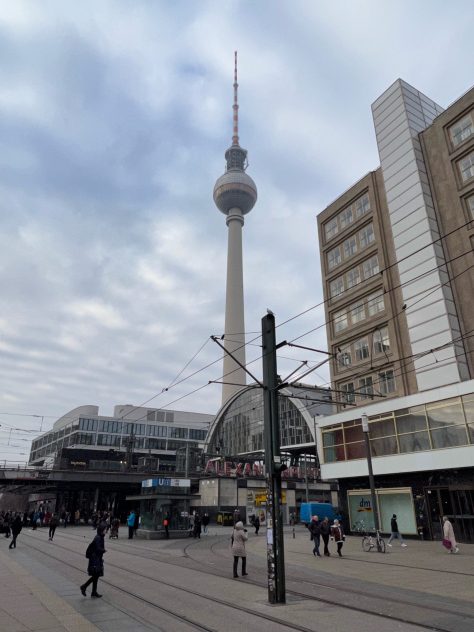Spent most of the week in Berlin for the Moving Target Conference.
I was at our London office on Monday. We had a team coaching session looking at our internal and external stakeholders.
On Tuesday I flew out to Berlin from Heathrow. When I was invited to the conference I did consider catching the train to Berlin, but after doing some research I found out it was going to take in excess of 20 hours and required not just changes (which I expected) but actually would entail taking a bus for part of the journey. So despite some reservations decided to fly. I would have preferred to fly from Bristol, but there were no direct flights to Berlin, so in the end flew from Heathrow.
Travelling to Terminal 5 from my hotel, I took an autonomous pod. These pods are for those parking at a car park, but were also available to hotel residents.
The conference was excellent and I enjoyed attending. It’s useful to see education from a different perspective.
The conference had a focus on trans-national education. There were some interesting panel sessions and presentations. I did a few sketch notes on various presentations and panel sessions.
Here is my sketch note of trust and reputation in the digital economy with Prof. Timm Teubner.
I delivered my keynote on the Friday.
Making the transformation happen: The UK higher education digital transformation journey
The UK higher education sector has over the last three decades invested heavily in information technology, online solutions, digital services, resources and content. The aim has been to enhance and improve and reframe the student experience, to reimagine learning, teaching and assessment, and to transform the infrastructure, the university estate to enable and enhance this digital transformation. Across this, Jisc, the UK national research and education network, has been proving the infrastructure, security, advice and guidance to the UK higher education sector. In this keynote, James Clay Head of Higher Education and Student Experience at Jisc, will explore what we mean by digital transformation, what it means for students and why the UK higher education sector needs to deliver on their digital transformation journey. He will explore the UK experience over the last few years and how this has helped to accelerate the digital transformation journey and will showcase exemplars from across the UK university sector. He will discuss how Jisc is supporting UK higher education and what are plans are for the future in enabling future digital transformation and what our colleagues can learn from our experiences and those of the UK higher education sector.
There was an online audience as well as people in the room.
The conference was at the Berlin-Brandenburgische Akademie der Wissenschaften (Berlin-Brandenburg Academy of Sciences).
The building still had the scars from the fighting in 1945.
It was a great venue for a conference, with good spaces. I also appreciated the fact that the building had eduroam, so connecting to the wifi was quick and easy.
I get a mention in the closing comments about my sketchnoting and tweets on the conference.
Saw this Twitter thread. Really useful list of locations in London for working and reading, where you don’t need to buy endless cups of coffee.
London folks, where’s a good spot (fairly central) that I can just go and sit with my book most of the day and don’t have to buy endless food or drinks?!
— Tilly (@TillyLovesBooks) November 29, 2022
Read this paper COVID, Campus, Cameras, Communication, and Connection by Jasmine Price, Donna Lanclos and Lawrie Phipps.
This article discusses insights from two separate and linked projects. A staff-facing project at a UK university in the English Midlands, took place in late Spring 2020. We heard at that time a concern from staff for students who were not in touch and were not “visible” due to their absence from digital places as well as the more obvious physical ones. Staff also discussed their sense that, from the students who were in contact, there were a lot more emails and one-on-one discussions about logistics and worries. In Spring 2021, at a university in the north of England, we conducted a student-facing project intended to discover their lived experience of the 2020-21 academic year, as well as surface insights into what the phrase “back to campus” might mean for these students. Students struggled with what their lecturers were asking in terms of visibility (especially cameras). Students were also concerned about building and maintaining connections. The desire for effective and transparent communication in a time of crisis was also expressed. We juxtapose the rhetoric about “back to campus” and assumptions embedded in policies around cameras and digital participation with the expressed desires of students for human relationships and care in a time of uncertainty and upheaval. We end with implications for institutions going forward, with the certainty that this will not be the last time, as a sector, when we have to rely primarily on digital places and platforms for the work of the University.
Well worth downloading and reading.
My top tweet this week was this one.
Here is my sketch note of Trust and reputation in the digital economy with Prof. Timm Teubner #MovingTarget2022 pic.twitter.com/pLZAQvVNY1
— James Clay (@jamesclay) December 1, 2022








